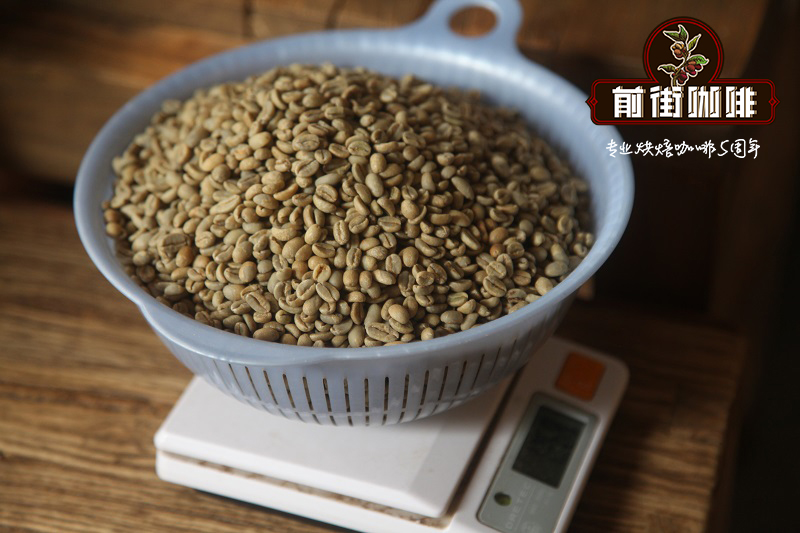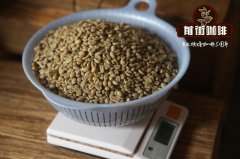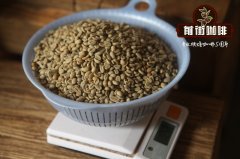Longberry microlot Variety Flavor | Wahana Rasuna e of Vahana Manor in Sumatra

Professional coffee knowledge exchange more coffee bean information please follow the coffee workshop (Wechat official account cafe_style)
Longberry microlot Variety | the story of the cultivation of Wahana Rasuna estate sun-dried beans at Vahana Manor in Sumatra?
Sumatra Wahana Rasuna Natural Process is grown on a farm in the village of Lae Mungkur, located in SidIkalang district, Dairi district, North Sumatra province. The farm is located in 1200-1500 masl and is used for coffee on 468 hectares of land. Founded in 2005, Wahana Estate is the only large private coffee farm on the island of Sumatra. It is located in the village of Lae Mungkur in northern Sumatra. The area is famous for its ideal climatic conditions for growing coffee and has the highest rainfall in the Lake dopa area.
This Sumatran Longberry microlot comes from Wahana Estate, which, as its name suggests, is a long, thin variety of beans. It is said to have originated in Ethiopia because it is similar to a variety called Longberry Harrar. Wahana Estate became one of its experimental varieties by bringing this variety to the Lake dopa region of Sumatra.
Wahana Graha Makmur translates as "ship is a great success". The mission of the property is not only to produce its own high-quality coffee, but also to improve the quality of coffee farmers throughout the region by providing advice and farm management to neighboring farms. The estate covers an area of about 500ha, of which 250ha is used to grow 13 different coffee varieties, each carefully segmented to produce a unique single variety of coffee, including local Indonesian hybrids such as Longberry,Rasuna,Andong sari, Toraya, Jember and Jantung. Another 30 hectares of the manor is used as a coffee nursery to improve the variety of single varieties grown on the manor. The new seedlings were cultured in a sandy seed bed for 3 months and then moved into plastic bags for 7 to 8 months.
A large part of Wahana Estate is protected, and the reserve includes many native plant and tree species along rivers and valleys. The farm can plant about 2000 trees per hectare, evenly spaced 2m x 2.5m, and plant shade under the local Lamtoro trees.
Wahana has its own wet grinding equipment, which was installed in 2009, and most of the coffee on the estate has been thoroughly cleaned-which is unusual for Indonesian coffee. Cherries are picked only when they are fully ripe and are graded and graded by hand before drying and grinding, and then pulped. The coffee is then fermented until the mucus can be removed, washed completely, and then dried to 11% humidity in the wide courtyard of the mill.
The property is an important local employer, with 8 to 1000 workers, and their families can use the on-site clinic. Provide workers with free housing, electricity, drinking water, health care (including free medicines), as well as kindergartens and kindergartens. The estate also built a church and a small mosque on the farm. The farm is also certified by the Rainforest Alliance.
The farm grows and processes its own coffee. It also buys cherries from its neighbors and processes their coffee! The fact that Wahana Rasuna 100% comes from Wahana Farm therefore means that it is more unique, single breed, and more controlled by it throughout the process. Friedman is the manor processing manager and explains that for their natural plants, they dry cherries eight hours a day at 50 degrees Celsius for 10 days. The Rasuna variety, which is grown on the farm as a "control" to measure the way other coffees compare to it (they also grow Catimor,Caturra,Catuai,Villa Sarchi,S795,Longberry, etc.), is itself a cross between Catimor. And Typica. The property exports about 7 to 10 containers a year.
Sumatra Wahana Estate is our first natural coffee from this part of Indonesia, but it is not actually a common preparation. Most of the time we will see wet kelp coffee from Mandheling or Lintong. However, the importers with whom we work regularly said one day that they had a cup of coffee they ordered, which was one of the top ten coffees they sampled last year. We took a flyer and bought some conditionally. It's just arrived, and it's a really interesting cup, especially if you think of it as an anomaly in regional production.
Wahana Natural is from the North Sumatra region, called Sidikalang, west of the volcano Lake dopa. Wahana Estate is a large and demanding experimental property that separates varieties, some of which are hybrids unique to Indonesia. Most of the production on the plantation is coffee washing, and they have invested heavily in the area. However, this special coffee is dry-processed, completely Rasuna, a mixture of Catimor and Typica, and originated in Sumatra. This new variety is being planted in the Takengon area, covering 90 hectares of Wahana land. The grapes are grown in Wahana Estate at a distance of 1300 to 1500 meters, all in the shade, so the trees can grow more slowly and naturally.
Farm: Wahana Estate
Venue: Sidikalang area of North Sumatra
Altitude: 1300 to 1500 m (4250 to 5000 ft)
Variety: la Souna
Processing: natural process of sun drying
The plantation says it observes the practices of the Organic and Rainforest Alliance, but they are not currently certified. The certification process may take a long time, so it should not be regarded as an official certification at this time, but rather as an indication of the intention of the plantation. We mentioned that Wahana is experimental, so if interested, they will also grow some "international seedling varieties", such as Villa Sarchi,Caturra and Catuai from Costa Rica and Colombia Typica from Colombia. These are local varieties and hybrids, such as Rasuna.
Cup features: peach, watermelon, citrus elements. Butter, cocoa texture has some unique characteristics of Sumatra, but processing and variety selection have increased a lot of interest. You will find some floral aromas, sweet dry aromas and strawberry flavors. This is a unique cup and has the opportunity to taste the unusual new grape varieties in this region.
Important Notice :
前街咖啡 FrontStreet Coffee has moved to new addredd:
FrontStreet Coffee Address: 315,Donghua East Road,GuangZhou
Tel:020 38364473
- Prev

The taste is outstanding. How high is the altitude of the cultivation of Rosario flor del rosario in Guatemala? Luo
Professional coffee knowledge exchange more coffee bean information please follow the coffee workshop (Wechat official account cafe_style) taste outstanding | how high is the altitude of Rosalio flor del rosario in Guatemala? How do Rosalio coffee beans taste? Finca La Flor del Rosario coffee was grown by farmer and owner Horst Spitzke in 1988 / 1989. Except for coffee.
- Next

Wet planing with unique regional flavor | wahana estate style of Vahana Manor, Sumatra Coffee
Professional coffee knowledge exchange more coffee bean information please pay attention to the coffee workshop (Wechat official account cafe_style) unique regional flavor of the wet planing method | Sumatra Coffee Vahana Manor wahana estate flavor and taste? This small batch of Sumatran Longberry comes from Wahana Estate, which, as its name implies, is a long, thin bean-shaped variety. It is said that due to the same name
Related
- Detailed explanation of Jadeite planting Land in Panamanian Jadeite Manor introduction to the grading system of Jadeite competitive bidding, Red bid, Green bid and Rose Summer
- Story of Coffee planting in Brenka region of Costa Rica Stonehenge Manor anaerobic heavy honey treatment of flavor mouth
- What's on the barrel of Blue Mountain Coffee beans?
- Can American coffee also pull flowers? How to use hot American style to pull out a good-looking pattern?
- Can you make a cold extract with coffee beans? What is the right proportion for cold-extracted coffee formula?
- Indonesian PWN Gold Mandrine Coffee Origin Features Flavor How to Chong? Mandolin coffee is American.
- A brief introduction to the flavor characteristics of Brazilian yellow bourbon coffee beans
- What is the effect of different water quality on the flavor of cold-extracted coffee? What kind of water is best for brewing coffee?
- Why do you think of Rose Summer whenever you mention Panamanian coffee?
- Introduction to the characteristics of authentic blue mountain coffee bean producing areas? What is the CIB Coffee Authority in Jamaica?

